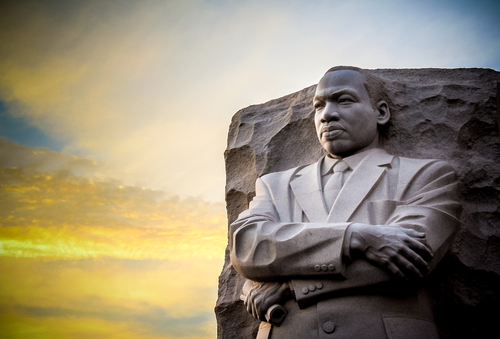In this most uncivil and harsh time of wall building and public name calling I am looking for witnesses of love, civility and justice; People who never return evil for evil, build bridges and never trash anyone who disagrees with them.
Within my lifetime the name that most quickly comes to mind is Martin Luther King. In 1963, during his incarceration for peacefully protesting racial segregation, he wrote his Letter From a Birmingham Jail, one hundred years after the emancipation of the slaves and three hundred and fifty years after the first African Americans were kidnapped and brought to the American colonies as slaves. I remember that my white beloveds in the 1960s said he was moving too fast. Too fast compared to what? I cannot imagine justice moving any slower for black folk than it did and does.
I have never met an Anglo, then or now, who admitted being racist. It was as if King made it all up. Turns out he didn’t.
I never knew much about him until I went to teach at Pepperdine University in the middle of L.A. in 1967. The civil rights movement had not existed in Abilene Texas. For three years nobody mentioned King in seminary. We were predictably segregated. But in Los Angeles King’s name was on everybody’s lips and he was generally hated. The Black Panthers hated King because they believed his nonviolent ways played into the hands of the white oppressor and the white folks said he was a communist insurrectionist. In April of 1968 King was assassinated in Memphis and I was teaching in the big middle of Los Angeles, a few miles from where the Watts riots had occurred two years before. For two days in L.A. the sirens never stopped, signaling lots of pain within the city. It was unforgettable, the anger, shame, and sadness James Earl Ray perpetrated on us that day.
As I was driving to my local Jewish delicatessen for my favorite sandwich at noon the next day a huge crowd of African American children began flooding into the streets in front of my car. I thought it was about to get violent, but it did not. Walking home the school children were devastated and sad, but they reflected MLK-they just respectfully mourned the day and walked on. I was grateful.
I played a lot of basketball with African Americans students that year. They were continually telling me, “Jesus Christ is the answer to the race problem.” Yet some of my Anglo colleagues thought they were dangerous radicals. I ran, sweated and competed with and against them and I knew better. They were my brothers. I had done the same years before with Charlie Maloney, my African American buddy from across the alley in Pueblo, Colorado-the boy my grandfather disapproved of just because of his skin color. Charley died long ago and I cherish his memory.
I have been blessed all of my life by prison literature, beginning with Ephesians. The most recent of that genre are these last words from MLK to his accusers in the Letter From A Birmingham Jail :
“If I have said anything in this letter that overstates the truth and indicates
an unreasonable impatience, I beg you to forgive me. If I have said anything
that understates the truth and indicates having a patience that allows me
to settle for anything less than brotherhood, I beg God to forgive me.
I hope this letter finds you strong in the faith. I also hope that circumstances
Will soon make it possible for me to meet each of you, not as an
Integrationist or civil rights leader but as a fellow clergyman and a Christian
Brother. Let us all hope that the dark clouds of racial prejudice will soon
Pass away and the deep fog of misunderstanding will be lifted from our fear
drenched communities and in some not too distant tomorrow the radiant stars
of love and brotherhood will shine over our great nation with all their scintillating
beauty.”
Yours for the Cause of Peace
and Brotherhood,
Martin Luther King, Jr.
Our brother still speaks!

